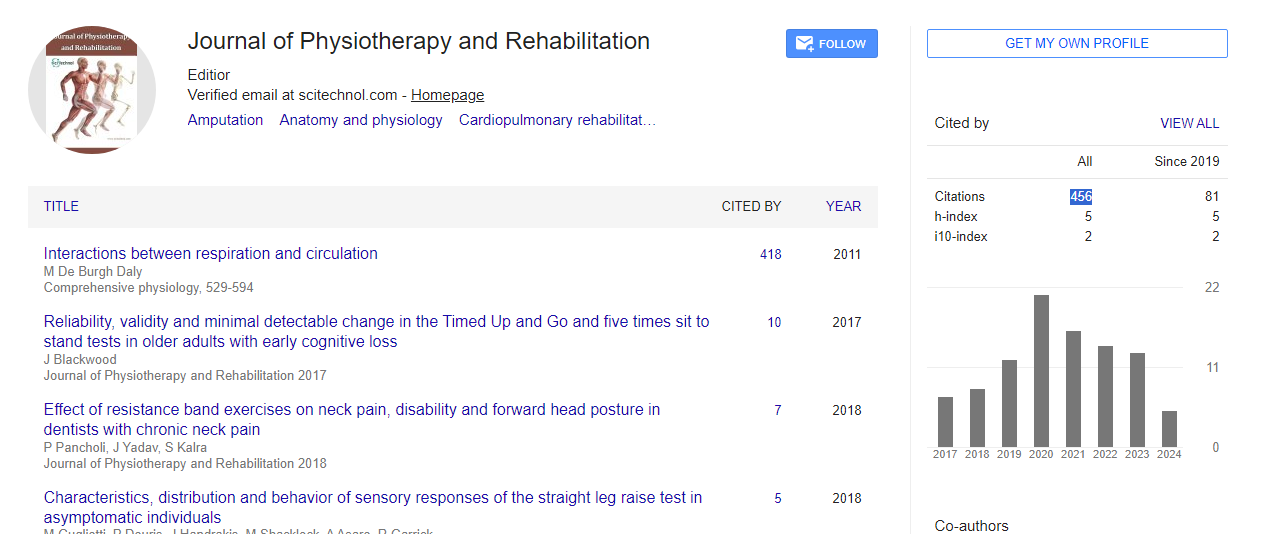Short Communication, J Physiother Rehabi Vol: 8 Issue: 1
Rehabilitation Strategies in Post-COVID-19 Syndrome: Insights for Physiotherapists
Amin Hale*
1Department of Physical Sciences, University of Leicester, Leicester, England
*Corresponding Author: Amin Hale,
Department of Physical Sciences, University
of Leicester, Leicester, England
E-mail: haleamin@mac.be
Received date: 02 January, 2024, Manuscript No. JPTR-24-134532;
Editor assigned date: 04 January, 2024, PreQC No. JPTR-24-134532 (PQ);
Reviewed date: 18 January, 2024, QC No. JPTR-24-134532;
Revised date: 26 January, 2024, Manuscript No. JPTR-24-134532 (R);
Published date: 02 February, 2024, DOI: 10.4172/JPTR.1000162.
Citation: Hale A (2024) Rehabilitation Strategies in Post-COVID-19 Syndrome: Insights for Physiotherapists. J Physiother Rehabi 8:1.
Abstract
Description
The emergence of the COVID-19 pandemic has not only posed significant challenges to global healthcare systems but has also highlighted the importance of rehabilitation in managing post-acute sequelae of the virus. As physiotherapists play a pivotal role in restoring function and improving quality of life for individuals recovering from COVID-19, it is imperative to delve into effective rehabilitation strategies tailored to address the unique needs of post- COVID-19 syndrome patients [1].
Post-COVID-19 syndrome, also known as long COVID, encompasses a diverse range of persistent symptoms experienced by individuals after recovering from acute COVID-19 infection [2]. These symptoms may include but are not limited to fatigue, dyspnea, muscle weakness, joint pain, cognitive impairment, and mental health issues such as anxiety and depression. The multifaceted nature of post- COVID-19 syndrome underscores the necessity of comprehensive rehabilitation interventions [3].
The primary goals of rehabilitation in post-COVID-19 syndrome are to enhance physical function, alleviate symptoms, improve respiratory function, and promote psychological well-being. Physiotherapists employ a simple approach to assessment, considering the individual's medical history, current symptoms, functional limitations, and psychosocial factors [4]. Objective measures such as pulmonary function tests, exercise tolerance assessments, and functional mobility tests aid in establishing baseline parameters and tracking progress throughout the rehabilitation process [5].
Exercise therapy plays a central role in post-COVID-19 rehabilitation, aiming to address deconditioning, muscle weakness, and cardiopulmonary impairments. Physiotherapists design individualized exercise programs based on the patient's functional capacity, symptom severity, and specific goals. Gradual progression and periodization are key principles to prevent exacerbation of symptoms and optimize outcomes [6]. Modalities such as aerobic exercise, strength training, flexibility exercises, and breathing exercises are incorporated into the regimen to target different aspects of physical function and respiratory health.
Respiratory complications such as pneumonia, Acute Respiratory Distress Syndrome (ARDS) and persistent dyspnea are common in COVID-19 survivors and require specialized respiratory rehabilitation interventions [7]. Techniques such as airway clearance maneuvers, breathing exercises, incentive spirometry, and respiratory muscle training can improve lung function, enhance ventilation-perfusion matching, and alleviate dyspnea. Moreover, education on energy conservation techniques and pacing strategies empowers patients to manage their respiratory symptoms effectively in daily activities [8].
Musculoskeletal and neurological manifestations, including muscle weakness, joint stiffness, neuropathic pain, and balance deficits, pose significant challenges to functional recovery in post-COVID-19 syndrome [9]. Physiotherapists employ a variety of interventions such as manual therapy, therapeutic exercise, neuromuscular re-education, and proprioceptive training to address these impairments and restore optimal movement patterns. Assistive devices and adaptive equipment may be prescribed to facilitate safe ambulation and mobility.
The psychological impact of COVID-19, compounded by the prolonged recovery period and uncertainty surrounding long-term health outcomes, underscores the importance of psychosocial support in rehabilitation. Physiotherapists play an important role in providing emotional support, counseling, and coping strategies to address anxiety, depression, Post-Traumatic Stress Disorder (PTSD) and other mental health issues. Integrating mindfulness-based techniques, relaxation exercises, and cognitive-behavioral interventions into the rehabilitation program promotes resilience and enhances overall wellbeing [10].
References
- Shanbehzadeh S, Tavahomi M, Zanjari N, Ebrahimi-Takamjani I, Amiri-Arimi S (2021). Physical and mental health complications post-COVID-19: Scoping review. J Psychosom Res:1;147:110-525.
[Crossref] [Google Scholar] [PubMed]
- Jacobsen PA, Andersen MP, Gislason G, Phelps M, Butt JH et al. (2022). Return to work after COVID-19 infection–A Danish nationwide registry study. Public Health.1;203:116-22.
- Lemogne C, Gouraud C, Pitron V, Ranque B. (2023). Why the hypothesis of psychological mechanisms in long COVID is worth considering. J Psychosom Res:165:111-135.
[Crossref] [Google Scholar] [PubMed]
- Ganesh R, Grach SL, Ghosh AK, Bierle DM, Salonen BR, et al. (2022) The female-predominant persistent immune dysregulation of the post-COVID syndrome. Mayo Clin Proc . 97:3:454-464.
[Crossref] [Google Scholar] [PubMed]
- Bruton A, Lee A, Yardley L, Raftery J, Arden-Close E, et al. (2018). Physiotherapy breathing retraining for asthma: a randomised controlled trial. Lancet Respir Med.1;6(1):19-28.
[Crossref] [Google Scholar] [PubMed]
- Evans RA, McAuley H, Harrison EM, Shikotra A, Singapuri A, et al. (2021) Physical, cognitive, and mental health impacts of COVID-19 after hospitalisation (PHOSP-COVID): a UK multicentre, prospective cohort study. Lancet Respir Med.1;9(11):1275-1287.
[Crossref] [Google Scholar] [PubMed]
- Singh SJ, Baldwin MM, Daynes E, Evans RA, Greening NJ, et al. (2023) Respiratory sequelae of COVID-19: pulmonary and extrapulmonary origins, and approaches to clinical care and rehabilitation. Lancet Respir Med.1;11(8):709-725.
- Davis HE, Assaf GS, McCorkell L, Wei H, Low RJ, et al. (2021) Characterizing long COVID in an international cohort: 7 months of symptoms and their impact. EClinicalMedicine. 1;38.
[Crossref] [Google Scholar] [PubMed]
- Blume J, Douglas SD, Evans DL. (2011) Immune suppression and immune activation in depression. Brain Behav Immun. 25(2):221-229.
[Crossref] [Google Scholar] [PubMed]
- Stam HJ, Stucki G, Bickenbach J. (2020) Covid-19 and post intensive care syndrome: a call for action. J Rehab Med 52(4)
[Crossref] [Google Scholar] [PubMed]
 Spanish
Spanish  Chinese
Chinese  Russian
Russian  German
German  French
French  Japanese
Japanese  Portuguese
Portuguese  Hindi
Hindi 